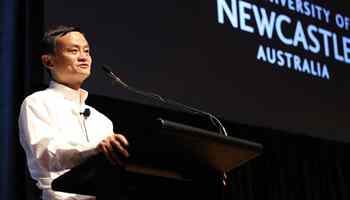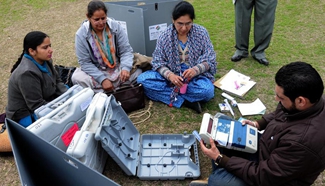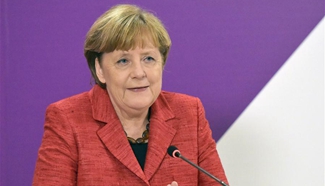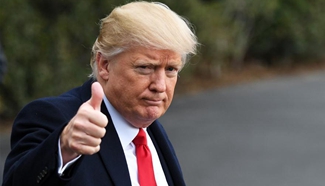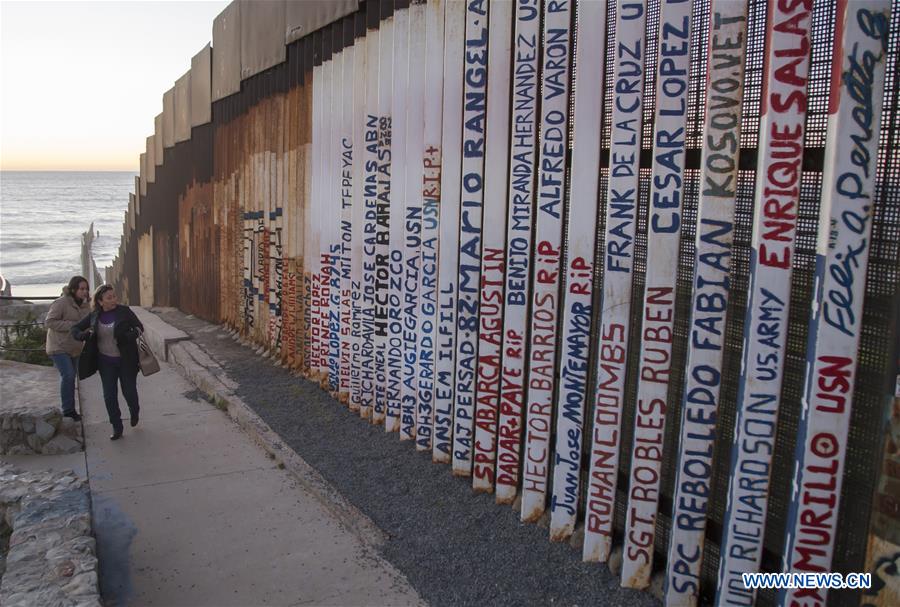
Image taken on Jan. 25, 2017, shows people watching a section of the border wall between Mexico and the United States, in Tijuana city, Mexico. U.S. President Donald Trump wants a 20-percent border tax on all imports from Mexico, said White House spokesman Sean Spicer on Thursday. (Xinhua/Str)
MEXICO CITY, Feb. 3 (Xinhua) -- U.S. President Donald Trump has given Mexico plenty to quarrel over, but the country is bent on averting confrontation with its main trade partner as it looks to Asia and other parts to diversify its export markets, say Mexican political observers.
Trump's combative style and disruptive policy changes have brought bilateral ties to an "impasse," said Benjamin Temkin, a research professor at the Latin American Faculty of Social Sciences in Mexico City.
Mexico is working to break the "impasse" by playing up its strengths and relying on national unity "to resist the pressures of the new U.S. government," Temkin said.
"Mexico wants to continue to maintain trade ties with the United States, but it is not willing to have conditions dictated ... that no Mexican government is going to be able to accept," said Temkin.
Experts say that although the United States is believed to have the upper hand in the bilateral dealings, Mexico still has options.
Mexico is adapting to the new situation by turning to Europe, China and other Latin American countries to seek more trade ties, noted Temkin.
Trump, who came to power on Jan. 20, has said that he wanted to renegotiate the North American Free Trade Agreement (NAFTA) concerning the United States, Mexico and Canada to get better concessions for U.S. industries and workers.
He has also floated the idea of applying a 20-percent tariff on Mexican imports to finance building a wall along the U.S.-Mexico border to keep out illegal migration and drug trafficking.
The tax proposal is "unacceptable" and in violation of the existing trade agreements, said Enrique Vargas del Villar, president of the National Association of Mayors (Anac).
The Anac supports Mexican President Enrique Pena Nieto's efforts to renegotiate NAFTA, but "we will only accept conditions that also benefit us, not just Trump," said Vargas.
The mayor of Huixquilucan, a town in the central state of Mexico, believes that Trump's inexperience in public office will complicate negotiations.
Since the United States imports 62 percent of its vegetables, 35 percent of the fruits and many other foods from Mexico, the suggested tariff will first hit American customers who have to pay a higher price for products from Mexico, said Vargas.
Meanwhile, experts have also noticed Mexico's over-reliance on the United States as its main export destination.
Mexico should not be so dependent on a single market, said Vargas, noting that "it can and should diversify its exports to Latin America, Europe, China and Japan."
Temkin believes that Mexico can learn from China about how to modify its economy to adapt to the changing times.
"We know that China has recently changed direction toward promoting greater domestic consumption, and Mexico will have to do something similar ... without closing up to the world, and while pursuing more trade treaties," said Temkin.






